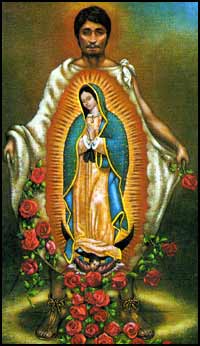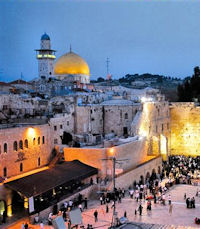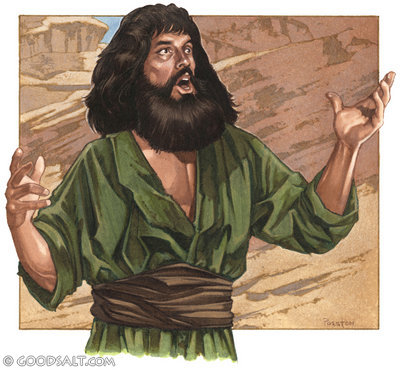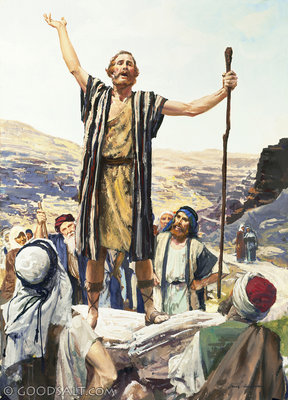
But who may abide the day of his coming and who shall stand when he appeareth? And this is the cry that goes up from the final pages of the Old Testament (Mal 3:2). And the Lord himself gives the answer:
See, I will send you the prophet Elijah before that great and dreadful day of the Lord comes. He will turn the hearts of the fathers to their children, and the hearts of the children to their fathers; lest I come and strike the land with doom! (Mal 4:5-6)
And thus with these words the Old Testament ends.
And so the New Testament opens in the desert but near the banks of the River Jordan with John the Baptist, of whom Jesus says, “He is the Elijah who was to come.” (Mt 11:14). Yes, in John the Baptist is the fulfillment of the Elijah figure who was to come to prepare the hearts of the people for the great coming of the Messiah.
And all this leads us to today’s Gospel, with John the Baptist summoning the faithful to repentance so that when the Messiah arrived, they would be ready. And for those of us who would be ready, we too need to go in the wilderness and hear the message of John the Baptist: Prepare the Way of the Lord! And though only the Lord can finally get us ready, we for our part must be able to say to the Lord, I’m ready as I can be.
Let us look at this gospel in three stages, going in the wilderness with John as our Teacher:
I. Context – The context of this Gospel is meticulously set forth by Luke: In the fifteenth year of the reign of Tiberius Caesar, when Pontius Pilate was governor of Judea, and Herod was tetrarch of Galilee, and his brother Philip tetrarch of the region of Ituraea and Trachonitis, and Lysanias was tetrarch of Abilene, during the high priesthood of Annas and Caiaphas, the word of God came to John the son of Zechariah in the desert.
OK, so what’s going on here, why all the specifics? It almost seems as if we are reading an Ancient Middle Eastern Phone book, or some list of “Who’s Who in the Eastern Mediterranean!” Yes, notice:
A. The Prestige - You might say there is a parade of the prestigious, a roll call of royalty, a list of leaders! We have an emperor – (i.e. the Federal Government), a local governor – (i.e. the State Governor), Three Tetrarchs – (state and local officials), two religious (and secular) leaders…you name it, all the “somebodies” are on the list. But it was not to any of the these glitterati that the Word of God came.
B. The Person – It was to John, the simple man in the dessert that the word went forth. Who? He was not on anyone’s list! John the who? And where do say he lives? Not in the palace or even in Jerusalem? Hmmm…. And yet recall:
1 Cor 1:27-29 But God chose what is weak in the world to shame the strong, God chose what is low and despised in the world, even things that are not, to bring to nothing things that are, so that no human being might boast in the presence of God.
Luke 10:21 At that time Jesus, full of joy through the Holy Spirit, said, “I praise you, Father, Lord of heaven and earth, because you have hidden these things from the wise and learned, and revealed them to little children. Yes, Father, for this was your good pleasure.
He hath lifted up the lowly, and the rich he has sent away empty. Yet to this simple man the Word of God came, and many went out to hear this unlettered man speak the Word of God in Wisdom.
C. The Place – Where is the word of God proclaimed and where is John the baptist fund and where will Jesus appear? In a palace? In the Ivy League Town of Jerusalem? No indeed, not in a palace, not in some air-conditioned controlled environment, not in a place of power, but in a place of vulnerability, where one experiences one’s limitations. In the desert neediness reaches out and grabs you. Yes, it is in a hot desert where the prophet was found. (Judean Desert upper right in photo)
Do you want to see Jesus? Go in the wilderness, leaning on the Lord. Jesus is a waiting to see you in the wilderness. Leaning on the Lord. There’s just something about experiencing our vulnerabilities that opens us to God. No palace with caviar here. A desert with locust and wild honey for food.
It is in this hostile climate that we go to hear the call and feel its power. Do you understand the context? The context is not be overlooked. The context is not found in the halls of power, it is found in the desert where thirst and and hunger hit rich and poor alike. It is hear that the Word of God is found and heard.
And this leads us to part two:
II. Call. The text says, John went throughout the whole region of the Jordan, proclaiming a baptism of repentance for the forgiveness of sins, as it is written in the book of the words of the prophet Isaiah: A voice of one crying out in the desert.
Now here notice two things:
1. WHAT is said - Here we have a basic Biblical call, “Repent and believe in the good news!” John said this but so did Jesus in his opening call: After John was put in prison, Jesus went into Galilee, proclaiming the good news of God. “The time has come,” he said. “The kingdom of God is near. Repent and believe the good news!” (Mk 1:14 -15)
There has to be a balance in preaching: Repent, and believe the good news! Modern thinking and practice has strayed from this kerygmatic balance REPENT! and BELIEVE the GOOD NEWS! Today many only want to hear or proclaim “Good News.” But the good news only makes sense if we understand the bad news and that we are in need of a divine physician. “Repent” sets the premise for the “Good news.”
Now as we have seen before, Metanoia (repent) means more than moral conversion. It means, more literally to have your thinking changed (meta = change, noia = thought) , to have your mind renewed, to think in a new way. Thus the basic message is to have our mind converted from worldly self satisfaction and self righteousness, and to be convicted of our need for forgiveness and our need for a savior. Yes, I am a sinner in need of a savior. I am bound for eternal death and destruction and cannot save myself. But there is Good News – the Savior is here, even at the door! And now I must arise and be ready to answer as soon as he knocks.
Our modern world, concerned more with comfort and relief, not real healing, needs to experience something of the desert where John was. There’s nothing like the desert to remind us our our frailty and neediness. In the Church today we have often stressed trying to make everyone feel comfortable. No talk of sin or controversial topics that might unsettle someone. Where’s the desert in that? John wasn’t found in some air conditioned marble palace. He was in the searing desert, with few creature comforts to be found. No padded pews here, no finely tune PA system, and no Air Conditioning, no pleasantries either. Just the call to come to a new mind, to surrender our stinking thinking, our misplaced priorities, our self-righteous, “I’m OK your OK, I’m basically a nice person” stuff and to accept that I am a frail sinner in need of a savior.
Now with the “bad news” established, the good news makes sense and really is good news, the savior is near at hand, even at the door. But for all this, we have to go into the desert and listen to a humble man, no the glitterati and the intelligentsia, John, clothed in camel hair and eating wild honey and locust.
And he does proclaim good news, but only if we’re ready. So on to part three.
III. Content - OK I’ve gotta repent, but what does that mean? John says, Prepare the way of the Lord, make straight his paths. Every valley shall be filled and every mountain and hill shall be made low. The winding roads shall be made straight, and the rough ways made smooth, and all flesh shall see the salvation of God.”
Notice then elements of the content:
A. READY for God – The text says, Prepare the way of the Lord. This is a hectic season where we’re all getting ready for Christmas. But most of this involves social readiness (presents, parties, poinsettias). But will we be spiritually ready for Christmas? We know how to get ready for a lot of things, tax day – We’re on time for work — We know how to catch a plane — We know how to be on time for a movie or a sporting event — We spend years getting ready for careers. But why don’t we spend more time being ready for God? The one thing most certain is that we will die and stand before God. Are you ready? The text says, PREPARE THE WAY OF THE LORD! This world will pass away but the things of God remain. Advancing careers and promotion are not certain, but death and judgment are. Why do we get ready for worldly and uncertain things and not take spiritual things all that seriously?
B. RIGHT with God - The text says, make straight his paths.…The winding roads shall be made straight! A winding road is a symbol of shifting priorities, waywardness, and a heart that is not steadfast or straight. Too often we are all over the moral map, we are inconsistent and crooked. Scripture says,
In all your ways acknowledge him, and he will make straight your paths. (Prov 3:6)
Put away from you crooked speech, and put devious talk far from you. Let your eyes look directly forward, and your gaze be straight before you. Take heed to the path of your feet, then all your ways will be sure. Do not swerve to the right or to the left; turn your foot away from evil. (Prov 4:24-27)
Consider an example. If I am driving from Washington DC to New York, and I see a sign that says, “South -Richmond” I know that to follow such a path is foolish. We know how to set a direct course for worldly destinations, and how to avoid going the wrong way. But what about our course home to heaven? We might sing: I’m on my way to heaven and I’m so glad the world can’t do me no harm. But then we see the exit, “Sin City, Next Exit” And sure enough we take it. Why do we take it? And then so many are outraged to hear that they can’t go whatever way they please and still land in heaven. And then comes all the anger directed at the Church and the Bible and preacher and any one who might wish to remind us that we have to make straight the ways of the Lord. You can’t go down to get up. You can’t turn left or right and say it’s straight. Thus the text says, make straight the way of the Lord.
C. REVERENT with God – The text says, Every valley shall be filled and every mountain and hill shall be made low. Now the mountain is pride. Every sin is pride since it says my way is better than God’s way, I know better than God, I am a modern man, and the Scripture is old fashioned, the Church is out of touch etc. This is the mountain of pride, and it has to go. God hates pride, He just can’t stand it. There is nothing that excludes us more from heaven than pride, thinking we know better than God.
And the valley is low self-esteem and despair. Now it may not be obvious, but a LOT of sins come from low self esteem. For example, we gossip and denigrate others because we think if they are brought low, we will feel better about our self. We also give way to peer pressure since we can only feel better about our self if we “fit in” and are approved by others, and we’ll even sin to do it. Some young ladies fornicate for the price of a beer and pizza, selling their bodies for less than a prostitute would, because they fear they won’t be loved if they do. Young men pressure young women and disrespect them because they don’t think they’ll be “a man” (or a stud) if they don’t. Many youth join gangs, even drop out and commit crime all to “belong” and be cool. Low self esteem is an ugly business that leads us to lots of sins. These valleys have to be filled in.
The solution to both pride and low self esteem is to fear the Lord, is reverence. The fear of human beings and what they will think is at the root of a lot of sin. That is why the Scriptures admonish us to fear the Lord instead. When I fear the Lord I don’t have to fear any one else. And when I reverence the Lord, my pride is dissolved. Mountains are made low and valleys leveled when we have a reverential and loving fear for the Lord.
D. REJECT ROUGHNESS by the Lord - The text says, the rough ways shall be made smooth. Rough ways are filled with obstacles, stumbling blocks and pitfalls. What are some of the things that hinder our ways, are obstacles or pitfalls? Are they relationships, lifestyles, habits? What are the things that cause me to stumble? Are they habits, excesses, or unlawful pleasures? What are the things that make ME rough and difficult to live with? Am I unyielding, unforgiving, unmerciful or unkind? Am I lax, frivolous, nonspiritual, and unaccountable? What are the rough ways in me and in my path that need smoothing? What trips me up and what in me needs softening and smoothing?
E.RECOGNIZE REDEMPTION from God – The text says, and all flesh shall see the salvation of God. The Greek word is ὁράω (horao) which while translated “see” involves an active receptivity, more in the sense “to look” than merely to have something overshadow us or cross our visual path. For the danger is that we can close our eyes. Thus we must remain active, receptive, and look for salvation and redemption, to seek it. It is a gift, but we must open our eyes and accustom ourselves to its light and to its ways.
It is very much like learning a language. Until we learn the meaning of the letters and the words and to make sense of a written language, its writings can look like gibberish. And for many today, the ways of faith are just that, gibberish. But for we who believe, having been made ready for God, making straight his paths, reverencing God and rejecting roughness, we are able to recognize our redemption. and to rejoice at its presence.







 For us another has been built upon it, the Jerusalem of Christians, God's kingdom on earth, the holy Church. This city still stands; it is the one which the divine King will enter at Christmas. Now we understand why we will hear so mach about Jerusalem during the coming week. We should now clean and adorn our city, improving its streets and avenues through which the Savior will make His entrance. As a motto we should take the words of the precursor, St. John the Baptist: "Prepare the way of the Lord, make straight His paths; let every valley be filled, every hill be leveled." Holy Mother Church's message today is that the Savior is coming to the Jerusalem of the Christians, to the Church.
For us another has been built upon it, the Jerusalem of Christians, God's kingdom on earth, the holy Church. This city still stands; it is the one which the divine King will enter at Christmas. Now we understand why we will hear so mach about Jerusalem during the coming week. We should now clean and adorn our city, improving its streets and avenues through which the Savior will make His entrance. As a motto we should take the words of the precursor, St. John the Baptist: "Prepare the way of the Lord, make straight His paths; let every valley be filled, every hill be leveled." Holy Mother Church's message today is that the Savior is coming to the Jerusalem of the Christians, to the Church. 


